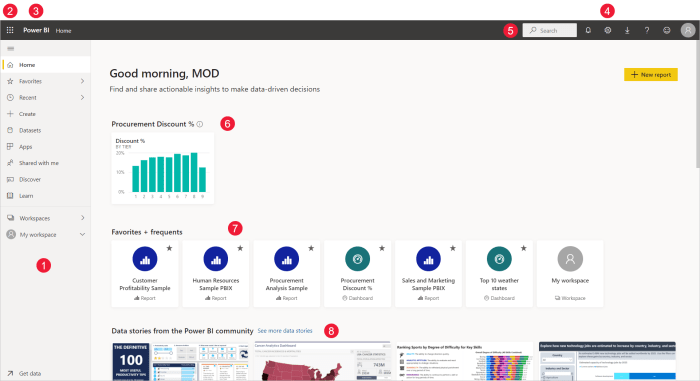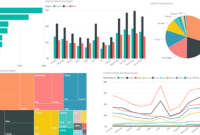BI services encompass a wide array of data-driven solutions that revolutionize modern business operations. From data integration to analytics and reporting, these services play a pivotal role in enhancing decision-making processes. Let’s delve into the world of BI services and uncover their transformative impact on businesses.
Overview of BI Services

Business Intelligence (BI) services play a crucial role in modern business operations by providing valuable insights derived from data analysis. These services help organizations make informed decisions, optimize processes, and gain a competitive edge in the market.
Types of BI Services
- Reporting and Analytics: BI services offer reporting tools to visualize data and generate insights through analytics.
- Data Mining: Utilizing algorithms to uncover patterns and trends in large datasets for strategic decision-making.
- Dashboarding: Creating interactive dashboards for real-time monitoring of key performance indicators (KPIs).
- Data Warehousing: Storing and managing structured data from multiple sources for analysis and reporting.
Benefits of Implementing BI Services
- Improved Decision-Making: BI services provide accurate and timely information to support strategic decisions.
- Enhanced Operational Efficiency: Streamlining processes and identifying areas for improvement based on data-driven insights.
- Competitive Advantage: Leveraging BI services to stay ahead of competitors by understanding market trends and customer behavior.
- Increased Revenue: Identifying new revenue streams and optimizing existing ones through data analysis.
BI Tools and Technologies

When it comes to Business Intelligence (BI) services, there are several popular tools and technologies that are commonly used to gather, analyze, and visualize data in order to make informed business decisions.
Popular BI Tools
- Tableau: Known for its powerful data visualization capabilities and user-friendly interface, Tableau is a popular choice for creating interactive dashboards and reports.
- Power BI: Developed by Microsoft, Power BI is another widely used tool that offers seamless integration with other Microsoft products and services.
- QlikView/Qlik Sense: Qlik’s BI tools are known for their associative data model, allowing users to explore data relationships easily.
- MicroStrategy: Offering a comprehensive suite of BI tools, MicroStrategy is often chosen for its scalability and advanced analytics features.
Role of Data Visualization Tools
Data visualization tools play a crucial role in BI services by transforming complex data into easily understandable visual representations such as charts, graphs, and maps. These tools enable users to identify trends, patterns, and outliers in the data quickly, facilitating data-driven decision-making processes.
Cloud-based BI Solutions vs. On-premise BI Tools
Cloud-based BI solutions and on-premise BI tools each have their own advantages and considerations when it comes to implementing BI services.
Maximizing business intelligence through data visualization is essential for companies to make informed decisions. BI dashboards provide a visual representation of complex data, making it easier for users to analyze trends and patterns. By utilizing BI dashboards, organizations can streamline their operations and improve overall performance. Learn more about BI Dashboards Maximizing Business Intelligence through Data Visualization to stay ahead in today’s competitive market.
- Cloud-based BI Solutions:
- Scalability: Cloud-based BI solutions offer scalability, allowing organizations to easily adjust resources based on their needs.
- Accessibility: With cloud-based BI tools, users can access data and reports from anywhere with an internet connection, enhancing collaboration and flexibility.
- Cost-effective: Cloud-based BI solutions often require lower upfront costs and eliminate the need for extensive IT infrastructure.
- On-premise BI Tools:
- Data Security: On-premise BI tools provide greater control over data security and compliance, which may be crucial for organizations dealing with sensitive information.
- Customization: On-premise solutions offer more customization options and can be tailored to specific business requirements.
- Performance: In some cases, on-premise BI tools may offer faster performance compared to cloud-based solutions, especially when dealing with large datasets.
Data Integration in BI Services
Data integration plays a crucial role in Business Intelligence (BI) services as it involves combining data from different sources to provide a unified view for analysis and reporting. This process is essential for organizations to make informed decisions based on accurate and comprehensive data.
Challenges of Data Integration in BI Services
Data integration in BI services faces various challenges, including:
- Lack of data quality: Ensuring that data is accurate, consistent, and reliable across different sources can be a major challenge.
- Data silos: Integrating data from disparate systems and applications to create a cohesive view can be complex, especially when dealing with legacy systems.
- Scalability: As data volumes continue to grow, ensuring that the integration process can handle large amounts of data efficiently is a challenge.
- Real-time integration: Keeping data up-to-date in real-time to support timely decision-making can be a challenge, especially when dealing with streaming data sources.
Best Practices for Data Integration in BI Services
To overcome the challenges of data integration in BI services, organizations can implement the following best practices:
- Establish data governance policies to ensure data quality and consistency.
- Use data integration tools that support a variety of data formats and sources to streamline the integration process.
- Implement data profiling and cleansing techniques to improve data quality before integration.
- Employ data modeling techniques to create a unified view of data across different sources.
Tools for Data Integration in BI Services
There are several tools commonly used for data integration in BI services, including:
- Informatica PowerCenter: A popular ETL (Extract, Transform, Load) tool that helps organizations extract data from various sources, transform it, and load it into a data warehouse for analysis.
- Talend: An open-source data integration tool that supports real-time data integration and provides a wide range of connectors for different data sources.
- Microsoft SQL Server Integration Services (SSIS): A Microsoft tool for building data integration solutions that allows users to extract, transform, and load data for BI applications.
- IBM InfoSphere DataStage: A data integration tool that enables organizations to integrate data from different sources and transform it for use in BI and analytics.
Data Analytics and Reporting: BI Services
Data analytics plays a crucial role in BI services by extracting insights from raw data to make informed business decisions. By analyzing historical and current data, organizations can identify trends, patterns, and correlations to drive strategic actions.
Real-Time Reporting in BI Services
Real-time reporting is essential in BI services as it provides up-to-the-minute data that enables organizations to respond quickly to changing market conditions. With real-time reporting, businesses can monitor key metrics instantly and make timely adjustments to improve performance.
- Real-time monitoring of website traffic to optimize marketing campaigns
- Instant notification of inventory levels to prevent stockouts
- Immediate alerts on customer feedback to address issues promptly
Key Performance Indicators (KPIs) in BI Reporting, BI services
Key performance indicators are metrics used to evaluate the success of an organization in achieving its objectives. In BI reporting, KPIs help measure performance against set goals and provide actionable insights for continuous improvement.
- Sales Revenue: Tracking revenue generated from sales activities
- Customer Acquisition Cost: Calculating the cost of acquiring new customers
- Customer Churn Rate: Measuring the percentage of customers who stop using a product or service
BI Service Providers

When it comes to BI service providers, there are several leading companies in the industry that offer a wide range of services to help businesses leverage their data effectively. These providers offer solutions for data visualization, reporting, analytics, and more.
Leading BI Service Providers
- 1. Tableau: Tableau is a popular BI service provider known for its user-friendly interface and powerful data visualization capabilities. They offer solutions for businesses of all sizes and industries.
- 2. Microsoft Power BI: Microsoft Power BI is another top player in the BI industry, offering a comprehensive suite of tools for data analysis, visualization, and reporting. Their integration with other Microsoft products makes them a preferred choice for many organizations.
- 3. Qlik: Qlik provides BI solutions that focus on self-service analytics, enabling users to easily explore and analyze data on their own. Their associative model allows for interactive and intuitive data discovery.
Comparison of Services
- Tableau excels in data visualization and ease of use, making it ideal for businesses looking to create interactive dashboards. Microsoft Power BI offers seamless integration with Microsoft products, making it a convenient choice for organizations already using Microsoft services. Qlik’s self-service analytics capabilities make it a great option for users who want to explore data independently.
Key Factors to Consider
- 1. Scalability: Consider the scalability of the BI service provider’s solutions to ensure they can grow with your business.
- 2. Pricing: Evaluate the cost of the services offered by different providers and choose one that fits within your budget.
- 3. Integration: Look for a provider that can seamlessly integrate with your existing systems and data sources for a smooth implementation process.
- 4. Support and Training: Consider the level of support and training provided by the BI service provider to ensure your team can effectively use the tools and maximize their benefits.
In conclusion, BI services offer a powerful toolkit for businesses to harness the potential of their data, driving informed decisions and strategic growth. By leveraging BI tools, technologies, and service providers, organizations can unlock valuable insights that propel them towards success in today’s competitive landscape.
Implementing a strategic guide to business intelligence success is crucial for companies looking to leverage data effectively. BI implementation involves setting clear objectives, choosing the right tools, and training employees on how to use them. With the right strategy in place, organizations can unlock the full potential of their data and drive growth. Discover more about BI Implementation A Strategic Guide to Business Intelligence Success to elevate your business intelligence capabilities.
Revolutionizing data analytics for businesses, cloud-based BI solutions offer flexibility, scalability, and cost-effectiveness. By leveraging cloud technology, companies can access real-time insights from anywhere, at any time. Cloud-based BI solutions are changing the way organizations approach data analysis, empowering them to make faster and more accurate decisions. Explore the benefits of Cloud-based BI solutions Revolutionizing Data Analytics for Businesses to stay competitive in today’s data-driven world.




